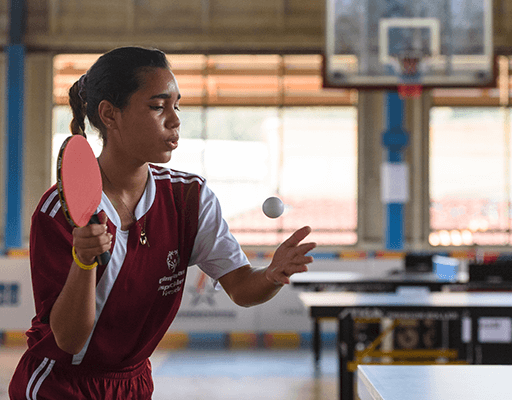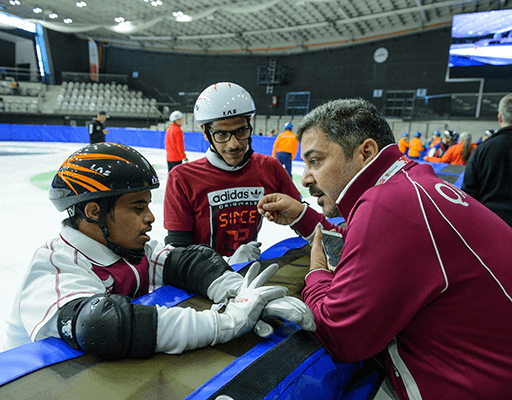Criteria for a successful unified sports program
Course Modules
Start Course
| Module 1 | Module 1 |
| Unit 1 | Introduction |
| Unit 2 | Special Olympics Mission and History |
| Unit 3 | Criteria for a successful unified sports program |
| Unit 4 | Course review |
| Unit 5 | Course test |
| Unit 6 | Sport: Unified Sports Coaching Course Evaluation Survey |
Powered By WP Courseware
Module Summary
Criteria for a successful Unified Sports program

What will success look like? How will you get there?
Your team members will be the evidence of success. You will witness them fully participating as team members. Each will contribute according to their own abilities. They will improve their sport skills and social interaction. They will help their team compete at their highest level. They will have fun.

How do you ensure success for your Unified Sports program?
Research, experience and feedback provide the answers!
You can ensure rewarding experiences for all teammates by implementing the Six Criteria for Success. It is important to include all six. If you only do some of them, you reduce the chances of creating a really successful Unified Sports program.
The Principle of Meaningful Involvement
The first criteria for success is meaningful involvement. Meaningful involvement is the guiding philosophy of Unified Sports. It requires that every player must be given the opportunity to contribute to the success of the team through their unique skills and qualities.
This means that every teammate:
-
Demonstrates sufficient sports-specific skills and an understanding of sport concepts.
-
Contributes to the team through unique personal strengths.
-
Can play without significant health or safety risks.
-
Plays according to the rules.
-
Makes an effort to include all their teammates.
Appropriate Sport Selection
Selecting the proper sport is important. Choose one which allows all teammates to be successful, and be meaningfully involved, and have fun. The sport should align with the ability of your players. However, it is equally important that it provides a challenge. Click or tap on the arrows below to learn more about the steps you should take in selecting a sport.
Learn about your athletes and partners' interests. What do they want to
do? What are they interested in? And what sport is possible to
implement?
Availability of suitable facilities and equipment is very important.
Your team may be interested in tennis. If there are no courts open for
practice or competition, you may need to explore another sport. You may
have challenges, but don't give up easily! A suitable venue can usually
be found.
Well motivated and trained coaches are critical to success. As a coach,
you need to:
- Be able to coach the fundamental skills and strategies of the chosen sport.
- Know the basic principles of coaching.
- Be committed to the mission of the Special Olympics.
- Be trained in Unified Sports.
- The best team is one in which all teammates play meaningful roles. This means all teammates contribute to the success of the team.
- All teammates are given similar statuses and not treated differently.
- Players (athletes or partners) do not coach.
- Players of higher ability on a Unified Sports Player Development team serve as mentors to lower ability athletes. They are not coaches. There must still be a non-playing adult coach.
It is vital for athletes and partners to have the necessary
sports-specific skills and understanding of how the sport is played.
This will allow them to participate successfully and safely. If there is
a range of ability levels among the athletes and partners, the Player
Development model is most suitable.
On Player Development teams, highly skilled and more knowledgeable players mentor their teammates with lesser abilities. If, however, the ability levels of all of the athletes and partners on a team are similar, then you would have a Competitive model team.
Competitive teams can be composed in a variety of ways: all teammates are at a beginner's level, or all teammates have moderate skills, or all teammates are high-level players. The key is ALL of the teammates have the same type of skill level with no significant variation.
On Player Development teams, highly skilled and more knowledgeable players mentor their teammates with lesser abilities. If, however, the ability levels of all of the athletes and partners on a team are similar, then you would have a Competitive model team.
Competitive teams can be composed in a variety of ways: all teammates are at a beginner's level, or all teammates have moderate skills, or all teammates are high-level players. The key is ALL of the teammates have the same type of skill level with no significant variation.
Finally, you should ensure that you choose a sport that provides the
thrill and satisfaction of competition. This means that if you are the
only team for your sport in your area and have no competition
opportunities, you must be prepared to either travel for competition or
consider another sport.
Qualified Coaching Staff
Recruiting qualified coaching staff is the third criterion for success in Unified Sports. Understanding and properly implementing Unified Sports is the most important aspect for coaches. Click or tap on the play button to watch this video on what is expected of a Unified Sports coach.
Trained Unified Sports coaches MUST:
-
understand and promote social inclusion
-
ensure all players contribute to the team
-
enable teammates to build connections through other activities
-
design drills to challenge all players
-
match players' ability to roles on the team
-
use team tactics to maximize the strength of players with lower abilities
-
demonstrate & expect sportsmanship
-
foster additional social experiences
Appropriate Team Selection
You’ve selected a sport to coach. You have ensured that it reflects the interests and abilities of potential team members. Now it’s time to begin building the team. You must select the teammates and determine the Unified Sports model of play that best fits their abilities. Selecting poorly matched teammates can result in player dominance, loss of enthusiasm, and even injury. Appropriate team selection is the fourth criterion for success in Unified Sports.
We have already noted the importance of ability in selecting Special
Olympics athletes and Unified partners. As with any team, ability is the
number one basis for teammate inclusion.
The next factor to consider is the age of your team members. All
teammates on a Unified Sports team should be of similar age. This helps
to promote social inclusion and ensure teammates are meaningfully
involved.
The recommended age guidelines are:
Closely age matching teammates helps social connections develop. The more closely matched in age your teammates are, the greater the chances of making connections on and off the field. This general guideline can also vary on a sport-by-sport basis.
The recommended age guidelines are:
- if any teammate is between 8-13 years - no more than three years between the oldest and youngest teammate
- if any teammate is between 14-18 years - no more than five years between the oldest and youngest teammate
Closely age matching teammates helps social connections develop. The more closely matched in age your teammates are, the greater the chances of making connections on and off the field. This general guideline can also vary on a sport-by-sport basis.
AAs the coach you will need to assess if your players are ready for
their sport. Are they physically, mentally and socially ready to ensure
they will have a successful experience on the Unified Sports team?
Your athletes and partners should be physically prepared for their sport. They should have gained the skills to participate safely and effectively in their sport. They should also be physically conditioned to meet the demands of their sport.
Are your players mentally ready? This is a training and competition program. Your teammates must be able to play according to the rules. They should be confident in competing. All teammates should appreciate and respect the roles of their teammates and opponents. They should also have knowledge of the tactics of their sport.
You will need to gauge the socialization skills of your players. Getting along with teammates is important in all team sports. It is a vital key to social inclusion both on and off the playing field.
Your athletes and partners should be physically prepared for their sport. They should have gained the skills to participate safely and effectively in their sport. They should also be physically conditioned to meet the demands of their sport.
Are your players mentally ready? This is a training and competition program. Your teammates must be able to play according to the rules. They should be confident in competing. All teammates should appreciate and respect the roles of their teammates and opponents. They should also have knowledge of the tactics of their sport.
You will need to gauge the socialization skills of your players. Getting along with teammates is important in all team sports. It is a vital key to social inclusion both on and off the playing field.
When you are looking for players, don’t forget about recruiting
participants from other organized programs. This could include:
- programs at school or work
- community programs
- corporate organizations with similar missions
Regular Training and Competition
The fifth criteria for success are providing your team with the chance to train and compete regularly.

Getting teammates registered
As a Unified Sports coach, you will be expected to follow all teammate registration requirements established by your Special Olympics Program and/or school. All teammates must be registered by completing the appropriate application, medical or release form.
These forms may vary slightly based on where you are located in the world. Please check with your local SO Program for required documents.
You may already have experience as a coach. You may know the value of building team cohesion. Select the headings below for a few tips to help build a cohesive Unified Sports team.
Coaches need to coach, not play. All Unified Sports teams must have a
non-playing certified head coach. Unified Sports coaches do just that –
they coach. You can’t be the best coach you can be if you are also
trying to play the game.
Share your time and instruction equally among all players. If you favor
certain players with more of your time, they may think they are not
contributing enough to the team. Favoring some athletes may also cause
others to feel their efforts are not worth your time. Ensure all of your
players receive appropriate instruction and feedback.
Offer constructive feedback, instruction and praise equally among all
teammates. Try to avoid singling out the athletes for criticism and the
partners for praise, or vice versa. Keep it as equal as possible and
everyone will feel they’re part of the team. They will see they are
improving their skills, contributing to team success and making friends.
If you are giving constructive feedback to a teammate, make sure to include positive feedback too.
If you are giving constructive feedback to a teammate, make sure to include positive feedback too.
You’ve come to the moment of truth! Can your team compete with that spirit of being a champion? Along the way, you’ve all been transformed by the experience of training and playing together. Now it’s time to put your team to the test. There are things you can do before the game begins to ensure a successful competition.
To ensure a successful competition experience for your team, as the coach you must:
-
ensure teammates are registered properly with the correct paperwork
-
provide a checklist for your players detailing what uniform to wear and whether meals will be provided
-
taking care of non-sports-related items will allow players to focus on the sports part of the competition
-
prepare your athletes from a physical, technical, tactical and mental perspective
Compliance with Official Rules
The sixth criteria for success is an understanding of and compliance with the rules. This includes all Special Olympics and sports rules that will be enforced. As in any competition, playing by the rules is important. Rules guide your decisions as a coach. They help to solve disputes. They ensure a level playing field for all. Unified Sports rules are listed in Special Olympics Sport Rules Article 1. They are also found within each sport’s Special Olympics rules. These are aligned with National Governing Body or International Sport Federations Rules. When necessary, these rules are modified by Special Olympics. Click or tap on the images to learn the fundamental rules of Unified Sports.

Unified Sports rules require an approximately equal number of athletes and partners on the roster. Sport-specific rules tell us how many athletes and partners can be on the field of play during competition. For example, in basketball there are three athletes and two partners. In volleyball there are three athletes and three partners.
Teams should be created based on ability levels and the suitable Unified Sports model. Applying the rules and teaching your teammates about them helps to ensure meaningful involvement and manage player domination.
